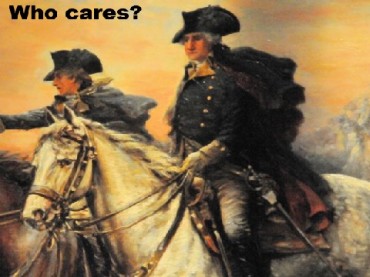
Nearly 30 of the nation’s top-ranked liberal arts colleges do not require students take a survey course in U.S. history, according to the findings of a report released Monday.
The American Council of Trustees and Alumni’s report, “Education or Reputation?” examined 29 institutions listed by U.S. News & World Report as the “Top 25” liberal arts colleges and universities nationwide. Several “ties” in the rankings raised the number of schools surveyed by the council to 29.
The council found that among that list of 29 schools, “not a single institution except for the military academies requires a foundational, college-level course in American history or government.”
“Shocking isn’t the word for it – in fact I’d go a step further – it’s civic disempowerment,” said Michael Poliakoff, vice president of policy for the council, in an interview Monday with The College Fix.
“Despite the fact that these students come from elite backgrounds and are quite networked, they are going to be leaving college with a very insufficient knowledge of the way our institutions work,” he said. “That does not bode well for democracy. Democracy is not automatically self-perpetuating; it requires knowledge and the engagement of its citizens.”
The council over the last 15 years has undertaken several extensive surveys of students to determine if U.S. history and government lessons taught during high school stays with students through college and beyond. Poliakoff said the answer is a definitive no. That’s a huge problem, he added.
“Those who don’t understand the mechanics of government are highly unlikely to be informed citizens,” he said. “These colleges, with these wonderful resources and vast wealth, squander all of the opportunities to educate people (with a) civic education.”
So what are these elite colleges teaching students? Well, it isn’t about the Federalist Papers or the Articles of Confederation. Consider the 56-page report’s anecdotes:
Middlebury College students can meet their historical studies requirement with ‘Food in the Middle East: History, Culture and Identity’ (whose course description asks the question, ‘Who invented Baklava?’) or ‘Mad Men and Mad Women,’ a course that uses the television show Mad Men ‘as a visual and narrative foundation [to] examine masculinity and femininity in mid-20th century America.’
Instead of providing any core curriculum at all, Grinnell College requires only one Freshman Tutorial course, which in the most recent course catalog includes sections entitled ‘Chess,’ ‘The Ethical Shopper,’ and ‘Bad Words.’ At Bowdoin, students can fulfill their Humanities Division Requirement with ‘Prostitutes in Modern Western Culture,’ ‘History of Hip Hop’ or “ ‘Bad’ Women Make Great History: Gender, Identity, and Society in Modern Europe, 1789-1945.
Among the list of 29 schools, the three military institutions on it – the United States Air Force Academy, the United States Military Academy, and the United States Naval Academy – are the only ones to require a survey course in U.S. history. Claremont McKenna requires U.S. government/history or economics, but not both, the report points out.
Underscoring these findings, only two on the list of 29 schools require an economics course, and only five require a literature course.
“To put this in context, a student at Bates College can avoid taking a survey course in U.S. history, but can fulfill his or her ‘general education concentration’ with courses such as ‘History of Electronic Dance Music,’ ‘The Rhetoric of Alien Abduction,’ or ‘Decoding Disney: Race, Gender, and Sexuality in the Animated Blockbuster,’” the report states.
Poliakoff said these types of courses are “cotton candy.”
“They might be very amusing and interesting and could indeed be intellectually challenging, but very, very limited and narrow topics,” Poliakoff said. “There is nothing wrong with doing them perhaps as electives, but they (should not substitute) for a foundational course in how a free society works.”
The institutions surveyed in the report are: Amherst, Grinnell, Hamilton, Middlebury, Vassar, College of the Holy Cross, Bates, Bowdoin, Haverford, Oberlin, Smith, Swarthmore, Wesleyan, Williams, Colby, Colgate, Harvey Mudd, Macalester, Pomona, University of Richmond, Claremont McKenna, Davidson, Scripps, Washington & Lee, and Wellesley colleges and universities, as well as the United States Air Force Academy, the United States Military Academy, and the United States Naval Academy.
The nearly 20-year-old American Council of Trustees and Alumni, based in Washington, D.C., describes itself as “an independent, nonprofit organization committed to academic freedom, academic excellence, and accountability at America’s colleges and universities.”
Click here to read the full report.
READ related article on today’s College Fix – Council of Trustees & Alumni: Top Liberal Arts Colleges Offer ‘Empty Promise’
Like The College Fix on Facebook / Follow us on Twitter






Please join the conversation about our stories on Facebook, Twitter, Instagram, Reddit, MeWe, Rumble, Gab, Minds and Gettr.